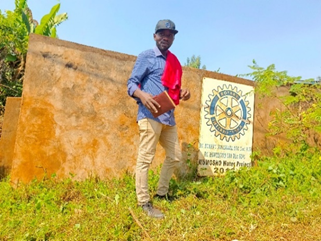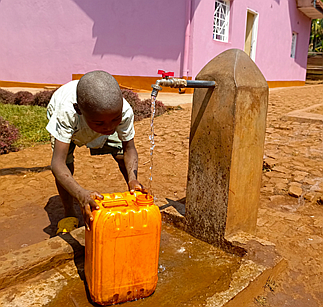Why I am a WASH Ambassador
Why I am a WASH Ambassador
 by Blessing Muderhwa, WASH Ambassador by Blessing Muderhwa, WASH Ambassador
Growing up in the Democratic Republic of the Congo, Blessing, saw firsthand that only two out of twenty-two villages had access to clean water and waterborne diseases were widespread.
Read about how he experienced the power of community-driven initiatives to bring clean water to his village.
 Growing up in Momosho village, Kabare Territory, South Kivu Province, Democratic Republic of Congo, I experienced firsthand the struggles of lacking clean drinking water. In my area, only two out of twenty-two villages had access to clean water, and waterborne diseases were widespread.
Growing up in Momosho village, Kabare Territory, South Kivu Province, Democratic Republic of Congo, I experienced firsthand the struggles of lacking clean drinking water. In my area, only two out of twenty-two villages had access to clean water, and waterborne diseases were widespread.
The Rotary Clubs of Bukavu Mwanganza, District 9150 and Rotary Club of Montecito, USA, District 5240 collaborated to construct a large water reservoir, transforming my village by providing clean water and reducing diseases.
In 2022, I was honored with the WASH22 Student Awards Rotary District 5450. This award funded my field research activities, reflecting my dedication to improving water, sanitation, and hygiene (WASH) conditions. This deepened my commitment to advocating for global health equity, particularly in ensuring access to clean water, sanitation, and hygiene.
My passion for global health equity drives my desire to serve as a WASH Ambassador. Access to clean water, sanitation, and hygiene is a fundamental human right and a cornerstone for sustainable development. As a WASH Ambassador, I aim to contribute to sustainable solutions for communities in need.
The mission of the WASH Rotary Action Group is to support and ensure the implementation of long-lasting clean water, sanitation, and hygiene programs. The global water crisis is stark: 2.2 billion people lack safely managed drinking water, and 3.5 billion lack safely managed sanitation, with 419 million continue to practice open defecation. Unsafe water, sanitation, and hygiene are responsible for the deaths of around 1,000 children under five every day. Moreover, at least two billion people globally use a drinking water source contaminated with feces.
Diarrhea diseases, the second leading cause of death among children under five, accounts for 9% of deaths in this age group. In the Democratic Republic of Congo, due to unsafe water, there are about 7,100 deaths from cholera and 19,000 deaths among the 45 million cases of diarrhea recorded each year in children under five. These deaths, mostly concentrated in Sub-Saharan Africa, are closely linked to low socioeconomic status and inadequate WASH practices.
WASH initiatives, such as water treatment, safe water storage, and handwashing with soap, have the potential to reduce the incidence of diarrheal diseases in children under five by 30 to 75%. Addressing these crucial challenges that kill my brothers and sisters every day in my country and region motivates me to promote sustainable and effective solutions as a WASH Ambassador.
My journey from a village in the Democratic Republic of Congo to becoming a WASH Ambassador showcases the power of community-driven initiatives. I am committed to advocating for those without a voice and contributing to the global effort to ensure clean water, sanitation, and hygiene for all.
|
|